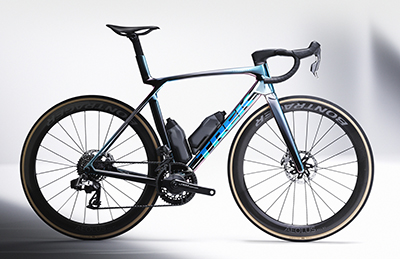| Plastics News |
Syensqo introduces sustainable polymers on the new Trek Madone road bike
Syensqo says its novel sustainable solutions provide a lower carbon footprint for parts on Trek’s new Madone Gen 8 introduced at the 2024 Tour de France July 30, 2024 - Syensqo, a global leader in Advanced Performance Materials and Chemical Solutions, introduced new products using recycled materials on Trek Bicycle’s latest Madone Gen 8. Trek Bicycle Corporation is a pioneer in bicycle design and manufacturing. The bike, introduced at the 2024 Tour de France, features small parts in the headset area manufactured using innovative glass-fiber reinforced high-performance polyamide (HPPA) compounds with a very high recycled content. According to Syensqo, the Trek Madone achieves a lower carbon footprint (PCF[1]) by incorporating these materials, helping advance sustainable practices within the cycling industry. “We are thrilled to embark on this exciting partnership with Trek, as part of our efforts to forge a greener future,” says Floryan Decampo Market VP Life Solutions. “Leveraging our expertise, we aim to assist Trek in meeting their ambitious sustainability goals within the rapidly expanding bicycle and e-bike industry.” “These parts are just one of the many things Trek is doing to reduce the impact of our products. In the future, we’ll continue replacing legacy polymers with lower carbon impact options. These materials will help Trek meet our carbon emission reduction goals and help our racers inspire a better world for cycling transportation,” says Reggie Lund, Senior Mechanical Engineer at Trek. The Syensqo and Trek Bicycle Corporation collaboration exemplifies how partnerships can drive industry progress. By integrating advanced materials into the Madone Gen 8 road bike, Syensqo is addressing environmental challenges and meeting consumer demand for eco-friendly products. The bicycle market is witnessing an unprecedented boom, particularly in the e-bike sector, where demand is soaring. In response, manufacturers are looking for innovative solutions that boost performance, cut costs, and lessen environmental impact. Syensqo's specialty polymers surpass traditional metals and plastics in e-bike manufacturing, delivering cost efficiency, design flexibility, and sustainability, the company claims. [1] The PCF data was calculated internally according to the ISO 14040-44 international standards for life-cycle analysis (LCA) in a cradle-to-gate approach including all raw materials and process steps to the final product exiting Syensqo’s site gate. The calculation was performed using SimaPro 9.5 LCA software in combination with ecoinvent database V3.9. Results refer to 1 kg of product as a functional unit, without packaging. Syensqo shall incur no liability in connection with the Information provided in this document in good faith. According to ISO 14040-44 standards, the use of LCA results to support comparative assertions intended to be disclosed raises special concerns and requires specific critical review. No critical review of these data was performed. Source: Syensqo
|


